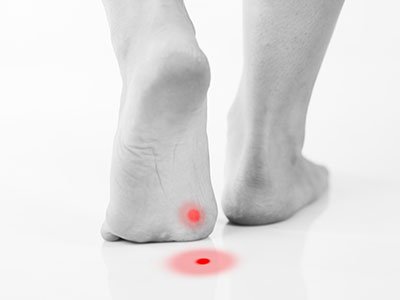


A plantar wart is an epithelial growth that occurs on the sole or toes of the foot that is caused by a strain of the human papillomavirus (HPV). The most common area for a plantar wart to occur is on the ball of the foot or on the heel. Standing and walking, which both put direct pressure on these areas, push the wart inward, causing discomfort and pain.
While plantar warts are contagious, not everybody gets them. Some individuals are more susceptible than others and they are most common in children and young adults. The virus can be picked up anywhere, but warm moist places like shower floors, locker rooms, and public swimming pools are popular breeding grounds for the virus.
Plantar warts can appear flat rather than raised because they are covered by the top layer of tough skin on the sole of your foot. However, they can also have a rough, grainy surface texture and can occur singly, or in clusters. The little black dots that are seen near the center of the wart represent the blood supply to the wart. While plantar warts exhibit certain distinguishing features, they sometimes resemble other skin conditions and lesions of the foot.
Our podiatrist will be able to determine if what you are suffering from is actually a plantar wart and not a corn, a callous, or a more serious problem. It is of the utmost importance that individuals who have diabetes, circulatory problems, or are immune compromised get an appropriate diagnosis and prompt care.
As far as treating plantar warts is concerned, the ultimate goal is to completely eradicate the wart so that it will not recur. Depending on the response to treatment, the successful elimination of a plantar wart may involve topical applications of medications, cryotherapy, immune therapy, surgical procedures, or laser surgery.